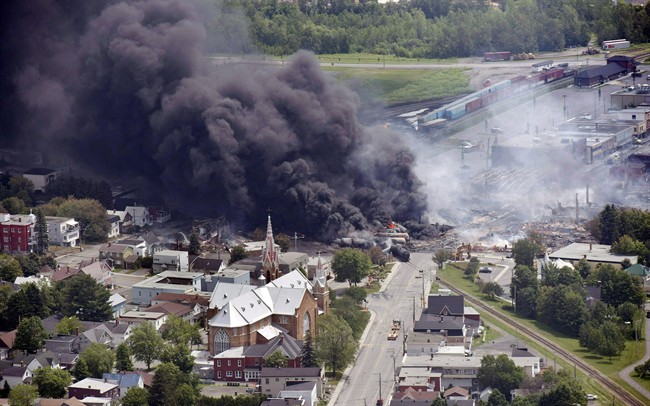Twelve jurors at the trial of three men charged with criminal negligence causing death in the Lac-Mégantic railway disaster began their deliberations Thursday.

Tom Harding, Richard Labrie and Jean Demaitre are charged in connection with the July 2013 tragedy in which 47 people were killed when a runaway train carrying crude oil derailed and exploded.
The three men pleaded not guilty.
READ MORE: MMA did not strive for safety: Defence lawyer at Lac-Mégantic criminal trial
Harding was the train’s engineer, Labrie the traffic controller and Demaitre the manager of train operations.
Thomas Walsh, one of Harding’s lawyers, told reporters at the courthouse in Sherbrooke, Que., the trial should have never taken place.
He said Thursday the evidence didn’t justify a criminal negligence charge and that his client was targeted because of public pressure to blame someone for the tragedy.
Harding “is very anxious and very serene,” Walsh said.
“I wouldn’t say he’s confident or he’s not confident. I think he’ll be very relieved when it’s over, one way or another, because it’s been a very difficult five years.”
READ MORE: Harding’s conduct not perfect, but reasonable: Lawyer for one of Lac-Mégantic accused
Walsh said the Crown’s own witnesses demonstrated that Montreal, Maine and Atlantic Railway, which owned the train that derailed, didn’t provide its employees with enough resources to maintain proper safety on its rail network.
Harding’s legal team maintains their client’s actions were not a marked departure from the behaviour of a reasonable person in similar circumstances and did not reveal a reckless disregard for the life of others.
The Crown contends Harding failed to perform a proper brake test and didn’t apply enough handbrakes after he parked the 73-wagon convoy late on the night of July 5, 2013.
Labrie and Demaitre were accused of failing to ask enough questions to ensure the train was properly secure after a fire broke out on the locomotive and firefighters shut off its engine, compromising the braking system.
The trial began Oct. 2.
WATCH: Lac-Mégantic closing arguments





Comments